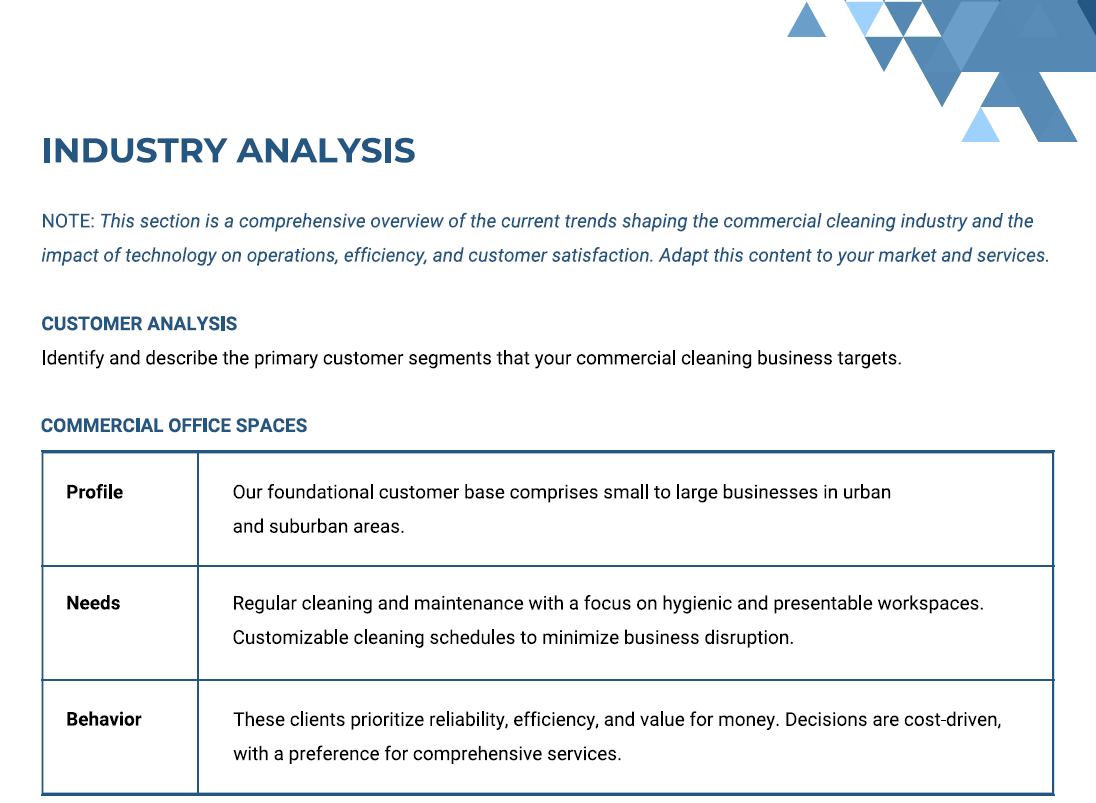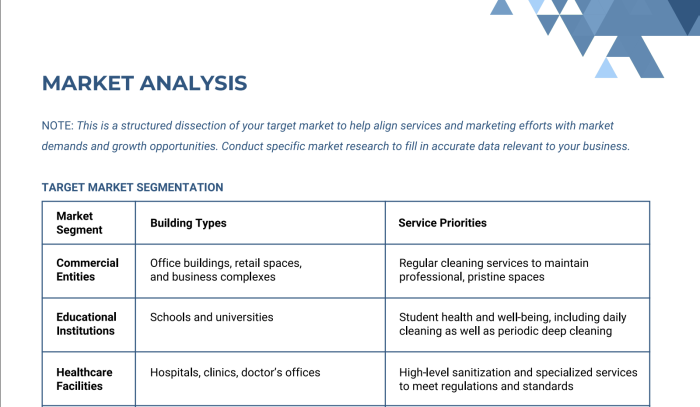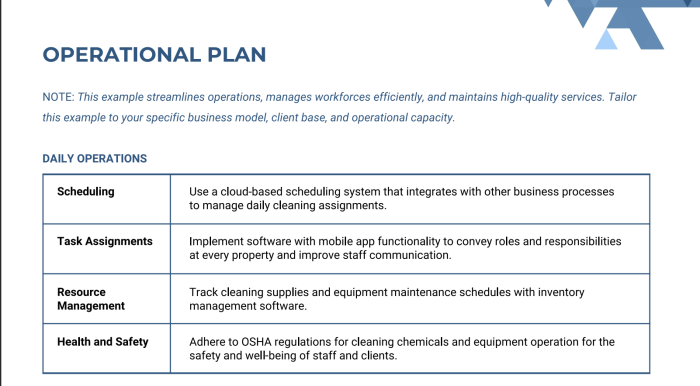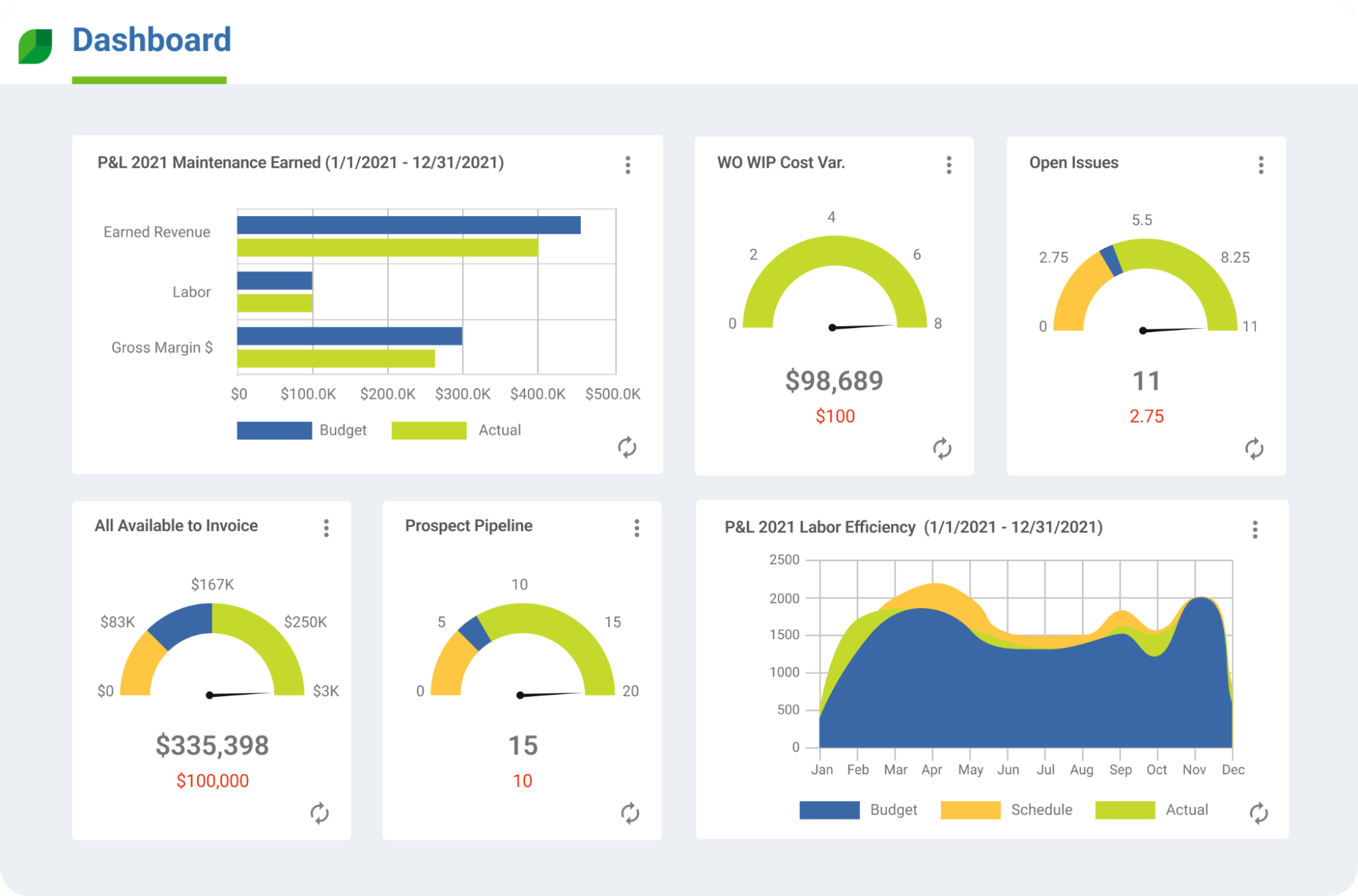

A commercial cleaning business plan can kickstart a new endeavor or clear the way for growth for an existing enterprise.
Crafting a comprehensive commercial cleaning business plan is pivotal to starting a new venture or fostering significant growth in an existing service. A well-structured business plan becomes a cornerstone for:
A cleaning company business plan isn’t a one-and-done task. You should regularly review and revise your business plan to evolve as your company grows to reflect your current vision, market, and financial targets.
This template provides a sample to help create a business plan.
An executive summary is an overview of your entire business plan.
While the executive summary is the first section of a business plan, most business owners find it makes sense to write it last. The executive summary often is one to two pages, but you should keep it as short as possible.
Essential components of an executive summary include:
Your executive summary must be clear and concise. If you’re seeking funding for your small business, the executive summary should demonstrate your cleaning company’s value to potential investors.

An industry analysis identifies the potential market for your commercial cleaning or janitorial services. This involves defining and comprehending key elements such as:
Commercial cleaning companies perform a customer analysis to understand and meet customer needs. This research-based process identifies your potential client base's demographics, values, and behaviors.
To perform a customer analysis:
Customer relationship management (CRM) software assists market analysis by providing invaluable information about your customers and their buying journeys.
→ Aspire commercial cleaning business software helps businesses connect the dots with real-time customer data, feedback, and analysis.
CRM data empowers companies to retain existing customers and expand their customer base by cultivating strong relationships with prospects and customers through:
A competitive analysis identifies the competitors in your market. It helps you understand market demand and gives your business a competitive edge.
For instance, if you plan to specialize in carpet cleaning or window cleaning, you’ll want to know if competitors offer these services and what they charge.
Steps to perform a competitor analysis include:
Once you know your customers and competitors, these assessments will help you develop effective marketing campaigns.

While a service business plan template provides a guideline for developing a marketing plan, it’s crucial to identify your company’s marketing goals and include methods to measure outcomes.
An effective marketing plan includes the following components:
Review your marketing plan annually. Some businesses review their marketing strategy and budget quarterly to adjust as needed.
A solid financial plan ensures your commercial cleaning business doesn’t just stay afloat but thrives.
To get funding for business operations, you’ll need a realistic estimate of:
A comprehensive, realistic financial plan shows potential partners and investors the value of your company and outlines business growth.
→ Include graphs and visuals in your financial plan to break down the numbers and easily communicate business information.
If you struggle with financial planning or creating budgets and forecasts, consider hiring a professional financial advisor.
The right business management software makes collecting accurate data in your initial months much easier to ensure your initial estimate and projections are sound.
→ The earlier you can adjust operations and pricing to maintain profitability, the quicker you can set and achieve new goals.
The following sections provide more detail about key areas of a financial plan.
Initial startup costs cover one-time expenses for a new cleaning or janitorial business.
While startup expenses vary based on several factors, the average cleaning service spends $3,500 on startup costs.
Startup costs may include:
You’ll also want to consider additional marketing and advertising dollars to spread the word about your business.

A clear understanding of operational expenses ensures you correctly price cleaning jobs and target realistic revenue goals.
Recurring expenses are costs you pay regularly to keep your business running. Ongoing expenditures include:
Some expenses may be fixed, such as the mortgage payment, while others may be variable, such as the cost of cleaning products.
Follow a budget, use best-practice accounting procedures, and track expenses to make needed financial adjustments.
Aspire’s comprehensive business management software collects financials above the gross margin line and pushes them in a one-way data sync to your accounting platform so you have clean, accurate data to inform your business plan updates.
Financial projections predict business revenue over a certain period. Data-backed financial plans drive better business decisions and help you plan for the future.
A startup cleaning business uses projected financial statements to determine future revenue and expenses. Industry and market analysis data can provide a starting point. In the case of an established cleaning business, use your historical data to project a percentage of financial growth.
To create a financial projection, you’ll need the following financial statements:
In financial projections, accuracy is key. You don’t want to inflate your numbers, fail to reach your goals, or underestimate and miss out on growth opportunities.
As your business continues to operate, it’s important to use the right software to capture accurate financial data to achieve financial objectives and increase the accuracy of future projections.
Aspire commercial cleaning business software integrates purchasing, invoicing, accounting, and payroll for full financial visibility. Robust reporting allows you to drill into sales, financials, job costs, and KPIs.
With real-time data, you gain deeper insight into business performance and can develop more effective business growth strategies.
A business operations plan outlines how your company will deliver high-quality service and achieve operational goals.
As you create an operations plan, involve your management team for ideas and input. After all, your managers are the ones who provide on-the-job oversight and remain accountable for operational goals.
An operations plan includes these elements:
Aspire provides user-based dashboards so every role can see the KPIs relevant to their short- and long-term goals. Having accurate, real-time information fuels responsive management, building ongoing growth momentum.
Commercial cleaning business owners who optimize operations experience the greatest profitability and growth. Aspire commercial cleaning business software provides seamless workflows in every area of business, including:
Streamlined processes reduce waste, increase efficiency, and improve performance in your operations.

Creating a thorough commercial cleaning business plan sets the stage for business growth. But successful results rely on how well you execute your plan.
Aspire commercial cleaning business software provides industry-specific management tools to empower business owners to take control of operations. From simplified scheduling to accepting customer credit card payments online, Aspire’s advanced features give cleaning contractors full visibility into business operations and finances.
To get your business plan off the ground, implement the right tools to improve business and boost year-over-year growth.
Ready to see what Aspire can do for you?Request a demo to see Aspire features in action.